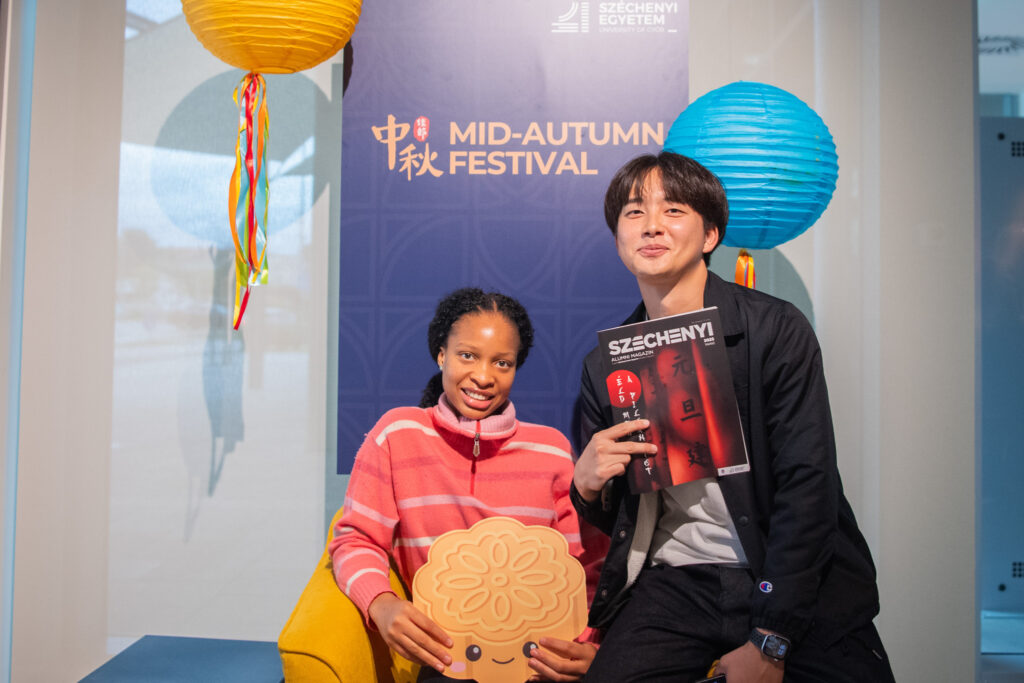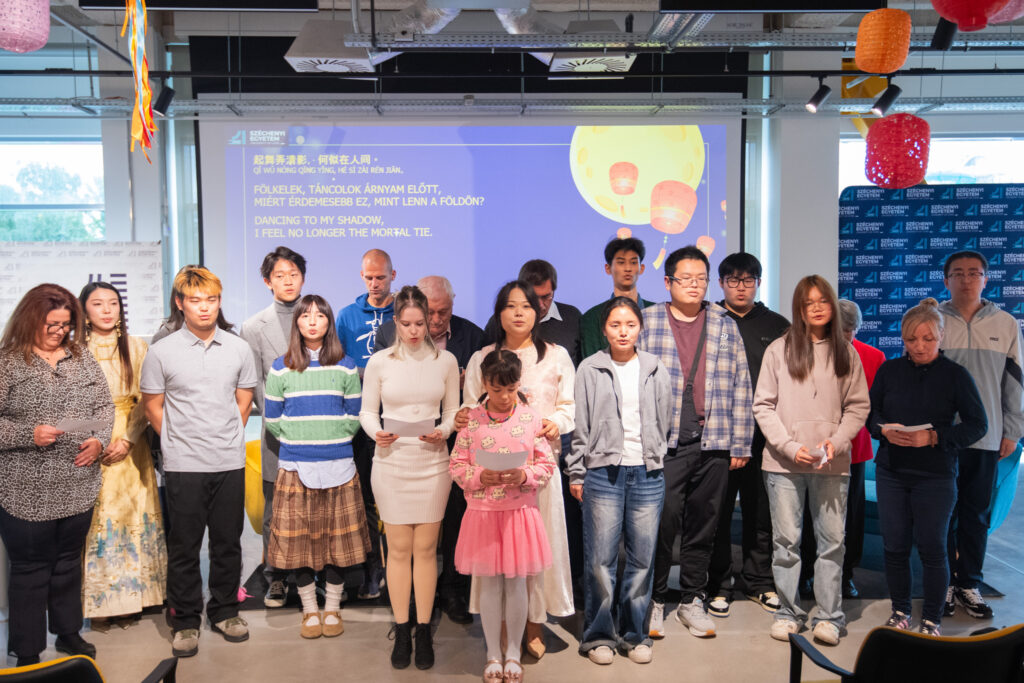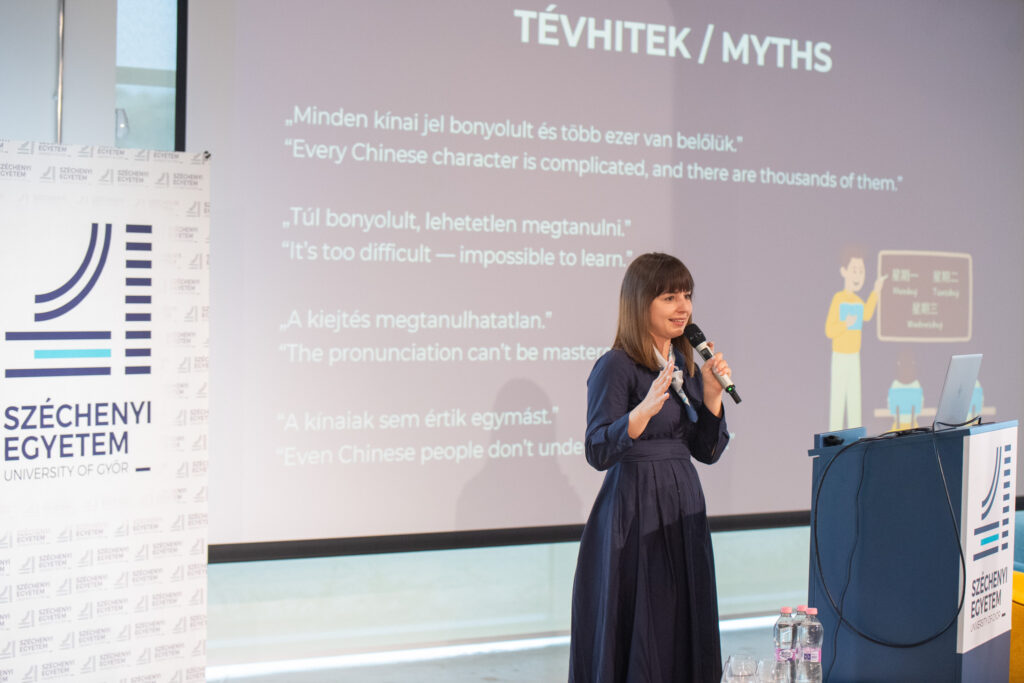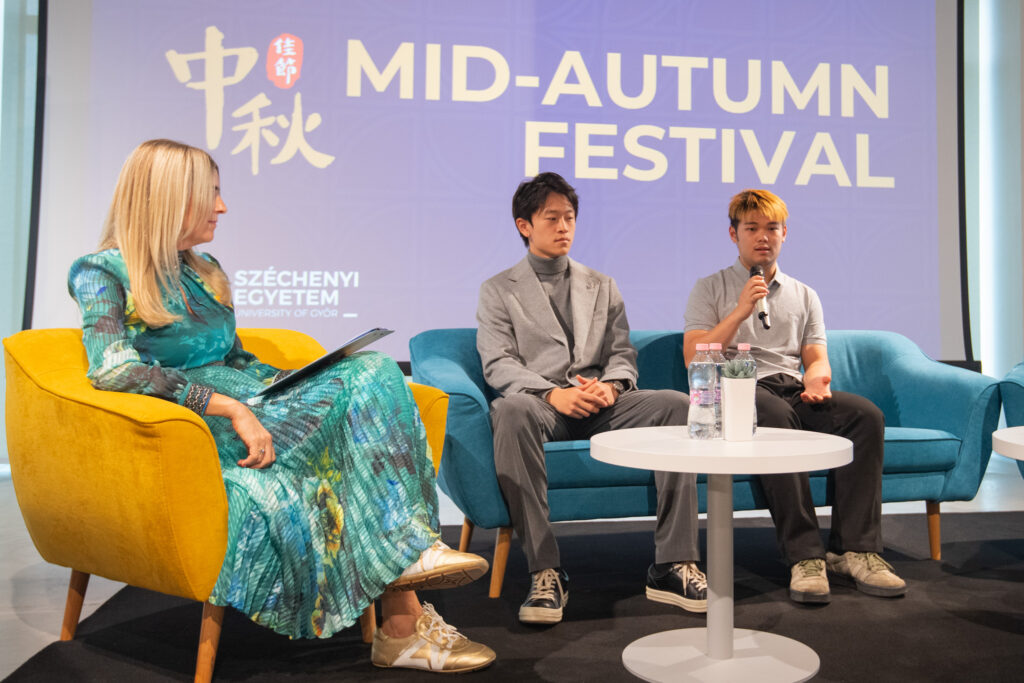Created: 2025.10.16. 10:54
Mooncakes, lantern making, and a collective poetry recital marked the celebration of one of the most significant events in Chinese culture, the Mid-Autumn Festival, at Széchenyi István University. Alongside visitors, the University’s students and staff, as well as participants of the Chinese language courses launched this autumn, took part in the event, which revolved around themes of togetherness, family and friendship, and the symbolism of the moon.
Széchenyi István University has increasingly close ties with China: in addition to strengthening its economic and academic relations, the institution also places great importance on promoting cultural values. In this spirit, the Institution organised its Mid-Autumn Festival event on 7 October — the second most significant Chinese festival after the New Year. The celebration, rooted in millennia-old traditions, took place at the University’s Győr Innovation Park, welcoming guests who could enjoy the programme together with Chinese students. Participants had the chance to taste mooncakes, the symbol of the festival, make their own lanterns, and test their knowledge through riddles and quiz games.
At the event, Dr Eszter Lukács, Vice-President for International Affairs and Strategic Relations at Széchenyi István University, highlighted that their growing community of Chinese students, visiting professors, and network of institutional partners — now encompassing 18 cooperation agreements — all serve as tangible results of the steadily strengthening relationship. “Our University’s key corporate partners include Huawei, NIO, and BAMO Technology Hungary Ltd. These collaborations enable not only the transfer of knowledge but also the joint shaping of future technologies,” she stated.
She emphasised that preparations are underway at the University for Hungary’s next Confucius Institute, which will significantly contribute to further deepening Hungarian–Chinese relations in both education and cultural exchange. “It is also a success that nearly 150 people from various age groups enrolled in our Chinese language classes supported by the University this academic year. This shows that interest in the Chinese language and culture is reaching ever wider segments of society each year and is increasingly becoming a key to our shared future,” she added.
.jpg)
The photograph shows Liu Hua, First Secretary of the Embassy of the People’s Republic of China in Hungary, and Dr Eszter Lukács, Vice-President for International Affairs and Strategic Relations at Széchenyi István University (Photo: András Adorján)
Liu Hua, First Secretary of the Embassy of the People’s Republic of China in Hungary, explained that the moon shines brightest on the fifteenth day of the eighth lunar month, which is why, in Chinese culture, this day is celebrated as the festival of family reunion — the Mid-Autumn Festival. “Today, standing here, surrounded by decorations reminiscent of my homeland and the fragrance of mooncakes, I truly feel at home. I believe this feeling stems from our shared values, centred on family and tradition,” he stressed. He added that the light of the moon shines over our entire planet, symbolising the peaceful coexistence of civilisations and the global community of humanity.
Gergely Granyák, Deputy Head of Department for Chinese Affairs at the Ministry of Foreign Affairs and Trade, shared that his professional journey with China began at the start of his career. Having lived in the country for five years, he developed a deep commitment to fostering economic and cultural relations. “Fifteen years ago, when the government launched its ‘Opening to the East’ policy, few would have imagined that relations between our two countries would develop at such a rapid pace and to such a significant extent. Today, our nation has become one of the most important meeting points between the Eastern and Western economic spheres,” he reflected. He highlighted that after the establishment of the People’s Republic of China in 1949, Hungary was among the first countries to establish diplomatic relations with the Asian nation — the 76th anniversary of which was celebrated in Budapest last week.
.jpg)
Gergely Granyák, Deputy Head of the China Department at the Ministry of Foreign Affairs and Trade (Photo: Balázs Miklós)
“Last year, more than two hundred thousand Chinese tourists visited Hungary, spending over half a million guest nights in our country. This type of tourism not only promotes mutual understanding but also contributes to economic growth in the fields of tourism, culture, and services. Educational relations are also developing, with more and more Chinese students arriving in Hungary each year — in the previous academic year, 2,800 Chinese students took part in Hungarian higher education, 295 of whom benefited from the Stipendium Hungaricum scholarship,” detailed Gergely Granyák. He expressed his hope that the newest cultural and educational institution, the Confucius Institute in Győr, will soon begin its operation at Széchenyi István University.
The most uplifting moment of the event came when participants of the University’s Chinese language courses — from young children to adults and senior learners — recited a poem related to the Mid-Autumn Festival together with the Chinese students of the University. Additionally, attendees learned about the festival’s origins and customs from Shen Zhi, International Project Officer at the University’s Centre for Languages and Culture, and Zhao Lijun, a Chinese guest lecturer. They also received a brief insight into learning Chinese from Réka Orosz-Barczi, Director of the University’s International Directorate, and heard a roundtable discussion moderated by Natasha Bailey-Borbély, Head of the Centre for Languages and Culture, where Chinese students shared their experiences of life in Győr.
Wang Shishuai, Wang Tianyi, Wu Fan, Deng Bowen, and Tang Anxin all expressed how much they enjoy studying at Széchenyi University and how grateful they are that events like this make them truly feel at home.













